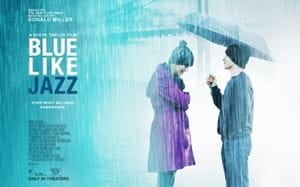
I was, no doubt, among the many devoted Donald Miller fans who met the news of his epic Blue Like Jazz being turned into a film with some hesitation. Sure, it spoke to millions in the early "Emergent Church" movement when it published in 2003 as "nonreligious thoughts on Christian spirituality". But would it make a good movie?
Nearly ten years after the book's first publication, Miller and filmmaker Steve Taylor meet the challenge with a resounding, "Absolutely".
Blue Like Jazz opens in select theaters April 13th as the story of a young man's spiritual awakening while at a secular, highly intellectual college. The lead character Don (True Blood's Marshall Allman) is a Texan Southern Baptist and fairly confident in his path. Even his haircut is sensible. His wayward father enrolls him in Portland's Reed College, saying that his mind would go to waste at the religious school where Don was already accepted. Don is at first reluctant. However, due to an unfortunate event that snaps him out of his good-guy rut, he throws caution to the wind and leaps at the opportunity to get out of Texas and head northwest. His adventures in what's right, what's wrong and the life that hangs inbetween begin.
This movie is not family-friendly, nor is it supposed to be. The PG-13 rating is for language and what I can only describe collectively as "mature themes". Let's just say that this ain't Facing the Giants nor Fireproof. About 20 minutes in, you forget any notion that this is a "Christian" film.
Marshall Allman as Donald Miller in Blue Like Jazz (Photo Credit:Zach Prichard/Jonathan Frazier)
Blue Like Jazz is an independent look at a fundamentalist who breaks out of his narrow-minded world into a virtual and spiritual free fall. Don meets several interesting characters on the way down including the resident crowned pope (played by Justin Welborn, who takes the role beyond the stereotypical funny, wacky sidekick/friend), a snarky, sensitive lesbian (LOST's Tania Raymonde), and the mysteriously alluring Penny (Claire Holt). Their dialogue helps keep the story from drifting into those dry, unreaslistic conversations that plague many family-friendly religious films. Several scenes made me feel as though I was standing in Don's shoes, because I'd been in those same situations, whether it's the embarassingly irrelevant church services or the uncomfortable Jesus conversations with non-believers.
The movie has moments of making the viewer wonder, "Where are they going with this?" However, the book had many of the same, and it's the non-campy believable performances of Allman and particularly Welborn that are enough to keep you going.
The film's only real crime is perhaps being a few years late to the cinema. Much of the enlightening revelations have been dissected ad nauseum by scores of authors, scholars, pastors and everyday Christians ever since the book came out back in the early 2000s. If you're expecting the film to bring something new to the discussion... eh, it won't. Instead, this movie is for (1) fans of Donald Miller who wanted to see if he could pull it off and (2) those still seeking who have somehow managed to be left out of the "Emergent Church" conversation of the last ten years.
Blue Like Jazz is worth seeing even if you've never read the book. In fact, going in fresh is perhaps the best perspective. Without preconceived notions, it shines as a story about people finding God in the most unlikely circumstances. The struggle Don has of marrying his faith to his reality (and certainly the realities of others) is something many can relate to, and Blue Like Jazz gives that struggle a face and a voice while never patronizing its audience.
As always in the book-to-film world, the movie doesn't do the book justice, but it's a good reflection. If anything, it brings the narrative parts of the book to life and paints Blue Like Jazz in more vibrant colors for fans and newcomers alike.
Blue Like Jazz opens April 13th in select theaters. Click here for theater listings or visit Blue Like Jazz online.


